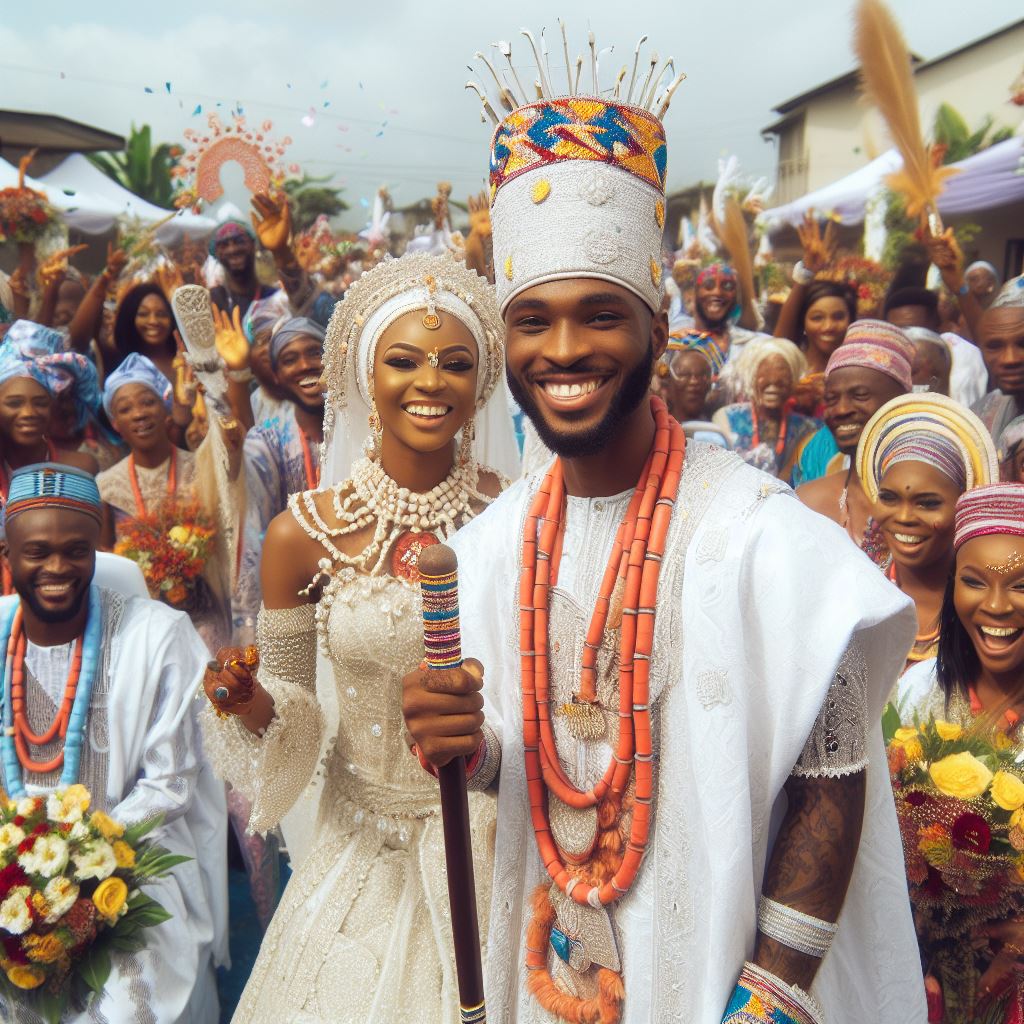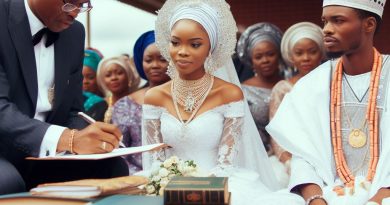Challenges and Joys: The Meaning of Marriage in Nigeria
Last Updated on January 28, 2024
Introduction
Nigeria, a nation known for its cultural diversity, holds a profound fascination with marriage.
In this vast and vibrant country, marriage isn’t just a union of two individuals; it’s an intricate blend of tradition, culture, and the essence of life itself.
The purpose of this blog post is to take you on a journey through the highs and lows of marital life in Nigeria.
We’ll explore the multifaceted joys and unique challenges that couples encounter as they navigate the beautiful complexities of matrimony in this diverse and culturally rich nation.
From traditional customs to modern influences, we’ll unravel the secrets of a successful marriage and discover how love, commitment, and cultural diversity shape this profound institution in Nigeria.
So, let’s embark on this exciting exploration of “Challenges and Joys: The Meaning of Marriage in Nigeria.”
Traditional Marriage Customs in Nigeria
The significance of traditional marriage customs in Nigeria
- Traditional marriage customs in Nigeria hold deep cultural, historical, and social significance.
- They serve as a way to preserve cultural heritage and maintain social cohesion.
- These customs are seen as a sacred union between two families, not just individuals.
- Traditional marriage customs strengthen family ties, create alliances, and foster community relationships.
- They provide a sense of identity and belonging, enhancing societal stability and continuity.
- Through these customs, Nigerian traditions and values are passed down from generation to generation.
The various traditional marriage practices across different ethnic groups in Nigeria
- Nigeria is a diverse country with over 250 ethnic groups, each having its unique marriage customs.
- The Yoruba people practice the “Introduction Ceremony” where families meet and exchange gifts.
- The Igbos have the “Igba Nkwu” ceremony, which involves the groom paying a bride price.
- The Hausa-Fulani people have the “Wuni” ceremony, where negotiations take place between families.
- The Tiv people celebrate the “Ushavwe” ceremony, involving traditional dances, singing, and feasting.
- These are just a few examples of the diverse and vibrant traditional marriage practices in Nigeria.
The importance of traditional marriage customs in Nigerian society
- Traditional marriage customs play a crucial role in preserving cultural heritage and diversity.
- They reinforce social norms, values, and expectations within Nigerian communities.
- These customs strengthen family bonds and promote unity among different ethnic groups.
- Traditional marriage customs also promote respect for elders, authority, and marital commitment.
- They provide a platform for showcasing traditional attires, rituals, music, and cuisine.
- Through these customs, Nigerians celebrate their shared history and express their cultural pride.
Traditional marriage customs in Nigeria hold immense value and significance.
They serve as a way to preserve cultural heritage, strengthen family bonds, and promote unity among different ethnic groups.
These customs contribute to the social fabric and identity of Nigerian society.
By understanding and appreciating these practices, we can embrace the challenges and joys of marriage in Nigeria.
Read: Eternal Love and Unity: Prayers for Your Nigerian Marriage Milestone
Challenges Faced in Nigerian Marriages
Gender Inequality and its Impact on Marriages in Nigeria
Gender inequality remains a significant challenge in Nigerian marriages, affecting both men and women.
In this patriarchal society, women are often seen as subordinate to men, leading to power imbalances within marriages.
Consequently, decision-making becomes skewed, and conflicts arise due to the lack of equal participation.
The Challenge of Financial Pressure and Economic Instability on Marriages
Another pressing challenge faced by Nigerian marriages is financial pressure and economic instability.
High rates of unemployment and inflation make it difficult for couples to maintain a stable financial situation.
Financial stress often leads to arguments, loss of trust, and even divorce.
Cultural and Religious Differences that Can Cause Conflicts within Marriages
Nigeria is a multi-ethnic and multi-religious country, resulting in diverse cultural and religious practices.
These differences can create conflicts within marriages as couples struggle to reconcile their individual beliefs and traditions.
Disagreements over marriage ceremonies, religious practices, and cultural expectations often strain relationships.
The Impact of External Influences, such as Family Interference, on Nigerian Marriages
External influences, particularly family interference, exert a significant impact on Nigerian marriages.
Extended family members often feel entitled to voice their opinions and meddle in marital affairs.
This interference can lead to conflicts, with couples finding it challenging to balance their own desires and those of their families.
Dealing with these challenges requires open communication, mutual respect, and a willingness to compromise.
Couples must recognize the importance of equality in marriages and challenge gender stereotypes.
Additionally, creating a healthy financial plan together and seeking professional help when needed can alleviate the pressure caused by economic instability.
Respecting each other’s cultural and religious differences is crucial for a successful marriage.
Couples should engage in open discussions, learn about each other’s traditions, and find common ground.
This understanding will help them navigate conflicts that may arise due to cultural and religious disparities.
Handling family interference requires clear boundaries and effective communication.
Couples should assert their independence, make decisions together, and establish healthy boundaries with their extended families.
Seeking marital counseling or guidance from trusted elders can also provide support in resolving disputes caused by external influences.
While Nigerian marriages face significant challenges, overcoming them is possible through dedication, understanding, and resilience.
By addressing issues of gender inequality, financial pressure, cultural and religious differences, and family interference, couples can forge stronger bonds and create fulfilling and long-lasting marriages.
In the next section, we will delve into the joys of marriage in Nigeria and explore the aspects that bring happiness and fulfillment to couples in this diverse and vibrant society.
Stay tuned!(Note: The above text does not contain HTML tags or the title of the topic)
Read: A Closer Look at Biblical Couples: Lessons for Today
Gain More Insights: Christian, Islamic, & Customary: Marriage Definitions Explored
Joys and Rewards of Marriage in Nigeria
Importance of companionship and emotional support in Nigerian marriages
- Nigerian marriages find great joy in the deep companionship and emotional support they provide.
- The bond of companionship and emotional support is considered crucial for a successful Nigerian marriage.
- Sharing life’s joys and sorrows with a loving partner brings immense happiness in Nigerian marriages.
- The emotional support from a spouse helps individuals navigate through the challenges of life.
The joy of building a family and the significance of parenthood in Nigerian culture
- Creating a united and loving family brings immense joy and fulfillment to Nigerian couples.
- In Nigerian culture, parenthood is highly valued and seen as a major milestone in married life.
- The joy of watching children grow and succeed is a cherished experience within Nigerian marriages.
- Nigerian couples find immense happiness in nurturing and guiding their children.
The rewards of shared cultural traditions and celebrations within marriages
- Participating in shared cultural traditions and celebrations creates a deep sense of joy and connection in Nigerian marriages.
- Nigerian couples find immense pleasure in celebrating festivals, holidays, and cultural events together.
- By embracing their cultural traditions, couples strengthen their bond and create lasting memories.
- Shared cultural traditions foster a sense of unity, identity, and pride within Nigerian marriages.
The happiness and security derived from successful marriages in Nigerian society
- Successful marriages in Nigerian society bring great happiness and fulfillment to couples.
- Knowing that there is a loving and supportive partner by one’s side brings a sense of security in Nigerian marriages.
- Happiness derived from a successful marriage positively impacts all areas of life.
- Successfully navigating the challenges of married life enhances overall well-being and happiness in Nigerian society.
Overall, successful marriages in Nigerian society are valued for the happiness and security they bring to individuals, families, and communities, reflecting
The cultural significance and enduring importance of marital unions in the fabric of Nigerian social life.
Read: Nollywood Movies: Perfect for an Anniversary Date Night

Strategies for a Successful and Meaningful Marriage in Nigeria
Importance of Effective Communication and Active Listening in Nigerian Marriages
- Clear and open communication is crucial for a successful Nigerian marriage.
- Both partners should listen actively to understand each other’s needs and concerns.
- Effective communication fosters trust, builds intimacy, and resolves conflicts peacefully.
- Expressing emotions honestly and respectfully enhances marital satisfaction and strengthens the bond.
Significance of Mutual Respect and Compromise in Maintaining a Healthy Marriage
- Nigerian marriages thrive when both spouses treat each other with respect and dignity.
- Showing appreciation and valuing each other’s opinions and contributions is essential.
- Compromise plays a vital role in resolving differences and finding common ground.
- Respecting personal space, autonomy, and individuality reinforces a strong marital foundation.
Value of Seeking Counseling or Professional Help When Facing Challenges in a Marriage
- Seeking counseling demonstrates a commitment to work through marital challenges.
- Professional help provides unbiased guidance, insights, and strategies for conflict resolution.
- A counselor assists in identifying underlying issues and aids in developing healthy coping mechanisms.
- Marriage counseling helps couples rebuild trust, improve communication, and reignite love.
Significance of Nurturing Love, Trust, and Loyalty in a Nigerian Marriage
- Love, trust, and loyalty form the foundation of a strong and meaningful Nigerian marriage.
- Nurturing love involves expressing affection, appreciation, and spending quality time together.
- Trust is built through honesty, reliability, and keeping promises within the relationship.
- Loyalty strengthens the marital bond, fostering emotional security and a sense of partnership.
In essence, a successful and meaningful marriage in Nigeria requires effective communication and active listening.
Mutual respect and compromise are essential to maintaining a healthy relationship. Seeking counseling or professional help is valuable when facing challenges.
Nurturing love, trust, and loyalty form the pillars of a lasting Nigerian marriage.
By implementing these strategies, couples can overcome obstacles and enjoy a fulfilling lifelong partnership.
Read: Essential Tips for Strengthening Marriages in Nigeria
Conclusion
Summarizing the complexities of marriage in Nigeria, we find a delicate balance between the challenges and joys.
Marital challenges often revolve around navigating diverse cultural backgrounds and managing financial constraints.
While the joys stem from the profound sense of companionship and the rich tapestry of shared traditions.
In the Nigerian context, understanding and addressing these challenges is paramount.
Couples must acknowledge the importance of respecting each other’s cultural roots and financial responsibilities, which can be formidable obstacles.
However, as they work together to surmount these hurdles, they create a nurturing environment where the joys of marriage can flourish. This mutual effort is crucial in achieving a harmonious and lasting union.
Concluding our exploration of marriage in Nigerian culture, it’s evident that despite the trials and tribulations, marriage holds a profound meaning.
It stands as a powerful source of love, unity, and cultural preservation.
Within the challenges, there lies the opportunity for growth and resilience, ultimately contributing to the significance and meaning of marriage in the rich tapestry of Nigerian culture.


